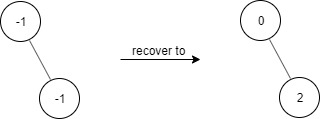Leetcode - Find Elements in a Contaminated Binary Tree
https://leetcode.com/problems/find-elements-in-a-contaminated-binary-tree/
Given a binary tree with the following rules:
-
root.val == 0 -
If
treeNode.val == xandtreeNode.left != null, thentreeNode.left.val == 2 * x + 1 -
If
treeNode.val == xandtreeNode.right != null, thentreeNode.right.val == 2 * x + 2
Now the binary tree is contaminated, which means all treeNode.val have been changed to -1.
You need to first recover the binary tree and then implement the FindElements class:
-
FindElements(TreeNode* root)Initializes the object with a contamined binary tree, you need to recover it first. -
bool find(int target)Return if thetargetvalue exists in the recovered binary tree.
Example 1:

Input ["FindElements","find","find"] [[[-1,null,-1]],[1],[2]] Output [null,false,true] Explanation FindElements findElements = new FindElements([-1,null,-1]); findElements.find(1); // return False findElements.find(2); // return True
Contaminated only means it has a default value. No need to consider what kind of shit that it stores.
1 2 3 4 5 6 7 8 9 10 11 12 13 14 15 16 17 18 19 20 21 22 23 24 25 26 27 28 29 30 31 32 33 34 35 36 37 38 39 40 41 42 43 44 | /** * Definition for a binary tree node. * type TreeNode struct { * Val int * Left *TreeNode * Right *TreeNode * } */type FindElements struct { root *TreeNode hash map[int]bool}func Constructor(root *TreeNode) FindElements { hash := map[int]bool{} dfs(root, 0, &hash) return FindElements{ root: root, hash: hash, }}func dfs(root *TreeNode, val int, hash *map[int]bool) { if root == nil { return } (*hash)[val] = true root.Val = val dfs(root.Left, 2*val+1, hash) dfs(root.Right, 2*val+2, hash)}func (this *FindElements) Find(target int) bool { return this.hash[target]}/** * Your FindElements object will be instantiated and called as such: * obj := Constructor(root); * param_1 := obj.Find(target); */ |
 评论 (0)
评论 (0)